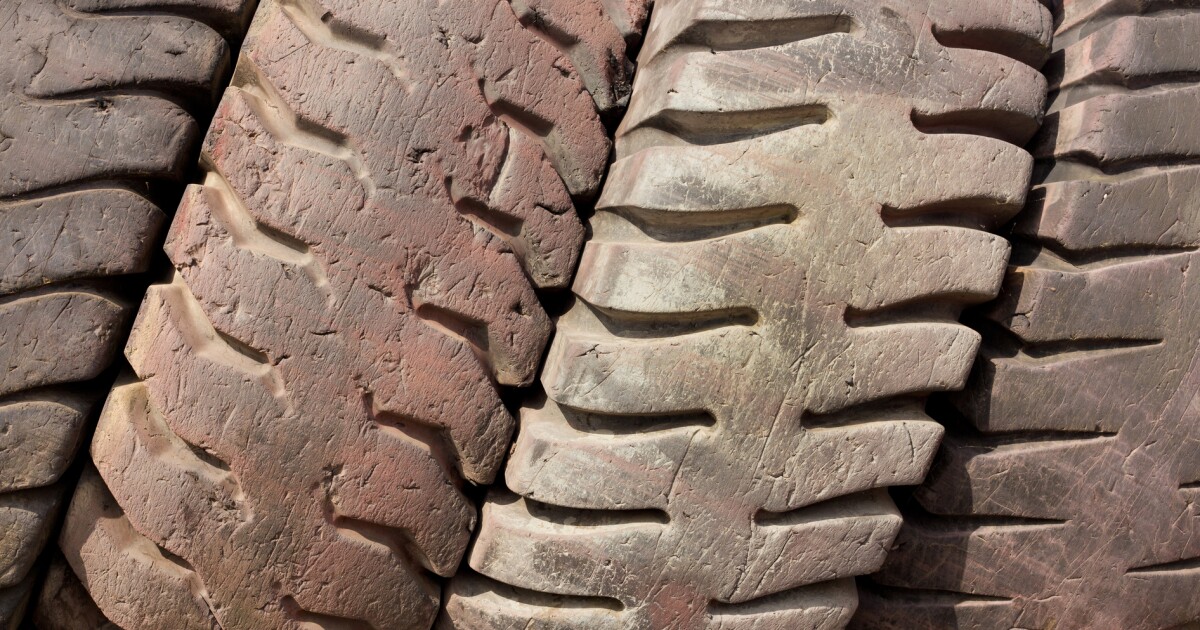I’ve always wondered about this. Similar to microplastics - everyone’s tires wear, meaning small vulcanized rubber bits are being shed everywhere people drive. There must be some level of environmental impact of this
In Germany half of the microplastic on land comes from tire wear.
Do you have a source?
In German it is this study from 2018: https://www.umsicht.fraunhofer.de/content/dam/umsicht/de/dokumente/publikationen/2018/kunststoffe-id-umwelt-konsortialstudie-mikroplastik.pdf
Micropetroleum in all sorts of forms is everywhere thanks to humans.
Even in raindrops!
Rubber bits are killing salmon
Removed by mod
Yeah, when I worked retail in a strip mall 15 years ago the outside windowsills got covered in this nasty black dust every day. Spent an hour of each shift cleaning it. One day the district manager mentioned that the company had it tested and it turns out that it was from tires wearing and giving off dust.
I’ve always thought about that. If one tiny shop in a strip mall got so gunked up with this stuff, what’s it doing to the rest of the planet?
deleted by creator
Cars driving and parking. Lots of cars.
What’s possibly equally frustrating is why did no one else think of this before?
Like we know everything wears down, but nobody seems to think “where does the worn material end up?” I imagine it’s mostly because it’s a product and so “had sale, don’t care.”
Scientists did think about this, no one listens though.
Hm I live next to a busy street, and my window slits keep filling up with a black powder that turns to sludge when a cleaner is added, I’m tempted to get it tested now.
Right? Rubber not lining highways says that we’re breathing that shit. How come everything we do turns to shit
Because everything we do revolves around burning toxic material
Speak for yourself. I enjoy simple things like large shrimp farmed in flooded areas.
Can we move away from cars already?? People act like this movement against cars is just some aesthetic aversion based on personal preference. But cars literally ruin everything they touch, from commute times, housing supply, local economic activity, household debt, air pollution, water pollution, ground pollution, and just plain being the number one killer of children in the developed world. It’s mind boggling that cars are so normalized that many can’t see how obviously harmful they are.
Ok so I move away from my car, and get a bike. Bike tires are still made of rubber. What do you say to that hmm? You got answer for that? If I just walk to work I’ll still be putting wear and tear on my shoes which are made of rubber as well.
There is a difference between cargo/kg of rubber tire. On your bike youre not carrying an external metal framework, liquid resirvoirs filled with liquids, air conditioning units, filters, fans, belts, double inaulated doors etc.
You can make the logical leap that the amount of rubber waste generated per person is likely different in different vehicle types. Cars vs busses, vs personal bikes. And a smart bet would be less per person on a bike vs car, considering both the weight and physical differences - e.g. speed, momentum and required force against the tires to accelerate and stop.
I shouldn’t have to say this: biking and walking do not pollute as much as driving a car.
No most ppl can’t, obviously. What we can stop doing is proposing no alternative when we tell ppl to stop doing something…you know. Like you just did.
There is no viable alternative to a car when it is 20 below and you have to drive 30 min to get to work.
You might notice I said we should “move away from cars” which obviously includes building alternatives not just abandoning cars.
If you’re responding in good faith and genuinely wanting to learn about this topic, you might try looking into how other countries (I presume you’re American or Canadian?) manage with fewer cars. For example, other cold countries like Finland and northern Japan walk, bike, and use public transportation all year round, even in -20 weather. Check out this video. Totally possible. Obviously, the US and Canada had big cities before the invention of cars, so I’m not sure why you think there are no possible alternatives to cars.
Am I wrong, or does Japan not have at least one car per household (obviously less in the cities, but the same is true with New York). I know this is less than the average American, but I’d suggest the reason for this has more to do with economics and space than public transportation options. In New York City, I can take the bus (why THE FUCK would I?) The rickety subway (which is quite good, despite its obvious age and lack of maintenance) The Railroads, or peddle down a hot, or frozen street on a Citibike. When all else fails, I can walk, which most for most places (in Manhattan at least) is a great option…
…Yet, traffic in New York City is still horrendous, and I still have a car – Because I need a car to get to places those other options can’t reach, and I’ll bet that’s true for a lot of people. I don’t have TWO cars like those in rural areas because of the expense, the difficulty of parking, and I have a decent public transit system.
The second point being you can’t get rid of cars. They’re required for too many people to live and work. That’s true for NYC. That’s true for Japan and I’ll bet it’s even true for everyone’s Darling Finland, which it doesn’t take much googling to discover is true. The best you can hope for is 1 car per household … unless we’re going to start raising cities and completely redesigning them and even then I’m skeptical.
Indeed, it’s not a question of cars vs. no cars. It’s about the extent of car dependence. We will always have some cars, even Tokyo and Amsterdam has cars, but right now, in the US and Canada, we are often forced to travel by car because we have no other options.
It’s also not just about whether one owns a car, but how much we use cars. The fact that most Japanese or Finnish families own one car doesn’t mean much on its own. A lot of those families only use their car a few times a month. Most commute by train or bus, or just walk to the grocery store. As bad as New York city traffic is, it would be much worse if you didn’t have options like subways and good sidewalks. It’s a spectrum, not black and white. But, right now, we are FAR on the car-centric extreme.
I will say that for most trips into Manhattan I’ll use public transportation (Train or Subway) just because it’s easier and less subject to traffic jams. It’s also just nice to read a book while traveling to work. Overall it’s a less stressful experience. Almost anything in the outer boroughs I need a car to get to (Parts of Brooklyn might as well be on the moon) However Manhattan is very different then anywhere in San Francisco, whose public transportation I found mind numbingly slow and less frequent.
One place that could use some major improvement is cross-country train travel. My wife and I took a train to Montreal about five years ago and I swore never to do this again. It was painful how slow and shitty that experience was. It really wouldn’t take a whole lot to improve this, the bar is that low. I would have paid more money! High speed rail will never get you to the West Coast as fast as an airplane, but if the experience and ease is worth it you can get more customers. However it doesn’t seem like Amtrak gives a single good God damn. They might as well be carrying freight.
deleted by creator
I know what you mean, but that turns out to be empirically untrue. Good transportation infrastructure encourages use in measurable ways (economists and urban planners call this “induced demand”). When you build out a train of bus network so that it’s actually useful, people start using it.
When it comes to safety and public transportation, I think the causality works the other way. In places with excellent public transportation, like New York and Toronto, everyone, including the middle class, uses public transportation. Not coincidentally, these places also have very low crime: New York is in the bottom 20% of US cities for crime severity, and Toronto is the safest city in North America. Under investing in the well-being of poor people, including public infrastructure, causes crime.
I’ve used the public transportation in several large US cities, and have never felt threatened by or fearful of the other passengers.
Finland and northern Japan are microscopic compared to Canada (or the USA). The reason it’s feasible there does not make it feasible here.
I hear this argument a lot but it doesn’t make any sense. The size of the country doesn’t matter for your daily commute.
It’s also nonsensical because living without cars was feasible in Canada and the US 100 years ago, and remains feasible in many small towns and big cities. Winnipeg, Calgary, Minneapolis, Los Angeles, Kansas City… they all had efficient and extensive tram and bus systems in the pre-war era. The walkable neighborhoods made before cars remain some of the most valuable and sought after real estate in North America.
Maybe in the cities. However in the 20s, for rural areas, Horse and carts were still in use. Automobiles replaced them.
A lot of rural areas built walkable town centres which still exist today. But sure, some areas will always need cars. That said, over 80% of the population of US and Canada today lives in urban areas, so let’s at least work on that 80%. It doesn’t have to be all or nothing.
Most of the people in both Finland and Japan live in cities, while most North Americans live in cities. Moving away from cars in rural areas may not be easy, but there is no reason why it would not be possible in the cities. The things that are needed are: denser cities (less tight zoning laws) and more alternatives to driving, like bike lanes or trams. These things are achievable by policy change. Also, the USA has around five times as much population density across the country as Finland, so while it may be big, it is not too big for decent alternatives to driving
Quick googling says Finland has 3.6 Million passenger vehicles for about 5.5 Million people. You want to hold up a shining example of a carless culture? try North Korea.
Have you ever heard of buses and trains? Almost every town over here with 10.000 inhabitants has trains running every 15 minutes in either direction.
The town I lived in with 90,000 residents had buses that didn’t run after 6pm or before 6am, so if you worked part time at a retail store that opened earlier or closed later at night buses were not an option.
Yes I believe we should be expanding and funding out public transportation, but until that happens we can’t just get rid of cars.
Stop shaming people for driving and instead shame politicians for not making it easier to ditch cars. It’s simply not possible for everyone everywhere.
Ah I think I finally see the misunderstanding. I don’t see anyone in this thread shaming anyone for using cars. What you say about pressuring politicians is totally compatible with the person you’re responding to. So it’s confusing why you think you’re on opposing sides?
I don’t think using cars is a personal moral failing. But if people are so fragile that we can’t criticize car dependence without it being taken personally, then progress is literally impossible.
That’s my point. Cars can easily be replaced, not abandoned. In my example, trains are sufficient to get to most cities with comparable speed. With enough funding for public transport - which isn’t even that much compared to maintaining roads and bridges - you could remove 95+% of cars.
Yet even here public transport is too unreliable too little service (note that I didn’t mention buses) and apparently people will use cars as long as there is a minor time benefit.
To illustrate my point: even though the bus service is mediocre regardless of where you live in my town, you are within one mile of everything you’d need on the daily basis (supermarket, pharmacy, bank…). However, there is a roughly 50 : 1 difference in parking spaces to bicycle racks because for some reason you either walk or drive a car.
Even in New York, that bus is either a completely miserable experience, require strict departure times, and might make your commute a lot longer.
I can’t imagine how awful they are in other places.
New York isn’t a bastion of excellent public transport. Other places do it better and buses can be good.
Who does it better?
Most cities in Europe & Asia. I live in Zurich and the buses are pretty much just as good as the trains and trams (which are top notch).
Bussing during rush hour sucks no matter what city it is. I’d rather bike, or if I could, I’d drive.
Well actually… driving during rush hour also sucks so I’m not sure between the two. During non-peak hours it’s not bad, kind of expensive though.
Where is over here? I think that might be important to establish.
Southern Germany. You can see a public transportation map here. Red is buses, orange is trains, green is trams.
“There is no viable alternative to a car when it is 20 below and you have to drive 30 min to get to work.”
Perhaps theres a solution buried in there. Organize society so were not burning our lifespan and the planet unecessarily commuting.
"There is no viable alternative to a car when it is 20 below and you have to drive 30 min to get to work.
Bus, train.
“What we can stop doing is proposing no alternative”
Bus, train, walkable cities, remote work, increased automation and reduced labour reducing commute requirements, production near consumption to reduce freight, tackling international economic inequities so it isnt cheaper to make a widget accross the world at poverty wages and ship it to those who live on the other side to buy within the means of their poverty wages - purchasing low quality quickly broken widgets that need consistent replacement and therefore further freight for that consistent supply.
This all means higher taxes to fund it all.
Good luck starting that initiative.You got that backwards. Suburbia and car dependency are already aggressively subsidized.
https://medium.com/by-the-bay/subsidizing-suburbia-2c3b66f88d4c
https://www.strongtowns.org/journal/2020/4/16/when-apartment-dwellers-subsidize-suburban-homeowners
You’re missing the point. Infrastructure costs money.
And cars require far more infrastructure than any other option…
Already paid for.
Again I can’t tell if you simply don’t get it or are intentionally obtuse in bad faith.
In the US, moving away from cars is a decade+ project. The alternatives are bicycles, trams, ebikes, walking, trains, busses, and subways.
All of them require substantial zoning changes and a change in focus from transportation departments from car capacity to people capacity and safety.
Most people in the US can’t feasibly not drive. A good start are things like my neighborhood. I live 1.5 from a shopping center with grocery store and other essentials, but have to drive there. It would be a minimal change and cost to connect a few neighborhood streets to the back of the shopping center or finish the sidewalk/bike trail that abruptly ends half way there.
Another good start is giving tax breaks for employers that do 32 hour work weeks or even 4 10 hour days to reduce driving.
Another idea is allow for small general stores in residential areas.
Another idea is HSR on easy routes like LA to Las Vegas.
Another idea is trams along long strips with lots of foot traffic like public beaches and Las Vegas boulevard.
Another is to add bollards in cities with bike lanes that are just painted lines on the road so people feel safer using them.
Plus China is repeating our mistakes and building out a massive amount of car-centric infrastructure. Huge disappointment given the amount of resources and wonderful transit they have in major cities
Idk, maybe public transportation? We’re not getting rid of cars, but one bus full of people is better than if every individual had their own cars. It’s not about elimination, it’s about reduction.
Exactly. I grew up on a farm and there’s no way a regular bus route would efficiently service us. Cars are still necessary but their usage can be greatly reduced.
For instance, in Europe most suburban/rural households can get by with one car. And in urban areas no car lifestyle is very easy to pull off
There is no viable alternative to a car when it is 20 below and you have to drive 30 min to get to work.
Funny you bring that up… bicycling in extreme cold is very similar to skiing, I’ve done it… no skin exposed, breathable layers, you have to worry more about getting too warm than too cold
You gonna force everyone into dense cities and make them walk or do you know of some new transportation techniques that will allow people outside of city center to ditch all their cars?
Go look at small towns in Europe and the fucking trains they have. Then weep when your city 100 times the size has worse public transportation than them.
You don’t need to live in a big fucking city for public transportation, you just need a government that fucking cares.
Removed by mod
Once upon a time, the US was the birthplace of the labor movement, fighting for labor rights like the 40 hour week and overtime pay. And now, the US is one of the most anti-labor countries in the developed world. When cars were first introduced, there were anti-car protests in US cities. It took decades of brainwashing by the car industry for Americans to feel that cars “make them American”.
Culture can change. It starts when people recognize how bad it is to depend on cars and demand better options.
Removed by mod
Beware of any history that makes the current state of affairs seem inevitable. There are always countervailing forces.
There are dozens of articles if you do a search online, but here is one article from Bloomberg.
Americans have grown up with versions of the “car culture” thesis: This is a nation that simply likes cars, and this preference is the biggest factor in the extent of car domination. Maybe clever marketing and interest group lobbying has something to do with this (the thesis concedes), and maybe the preference is not rational; still, we prefer cars, even in settings that are poorly suited to them, and even to the point of putting up with their high financial, social, environmental, and safety costs. All over America in the 1950s and 1960s, residents, particularly women, organized demonstrations against car traffic.
Anti-car protests were successful in places like New York City and Vancouver, Canada, which is why they are some of the only places in North America without highways cutting through them. San Francisco also had major protests, but highways were forced through anyways.
Removed by mod
People might laugh or discount your comment, and you might’ve made it in jest, but that’s probably one of the biggest hurdles that the anti-car crowd refuses to take seriously. Americans love cars, and a lot of Americans for sure love gigantic monstrosity tricked out cars. We have songs about trucks, guns, and Jesus, and you can bet your ass those things are the same level of special for a lot of people.
I personally would love to see viable public transportation, but you’re going to have to change culture which isn’t as easy as, “We built some nice trains and buses! Now everyone use those instead!” You’re going to have to convince the gun toting, Jesus loving, jacked up Ford F-450 Super Duty owners to give up a huge piece of their personality. And from what I can tell that hasn’t been working out so great with guns. Maybe we can write a nice country songs about riding trains and buses? We used to have a few of those.
I would love to hear a country song about running a train through rural America.
You just described folk music.
I can’t tell if you’re joking, but train songs used to be a huge rural working class genre.
That’s the difference. The government doesn’t have the desire, or the people don’t vote in favor. In some cases, they don’t even have the money.
Hi I live in a small European town and still need a car. It’s not the gotcha you think it is. The busses and trains are neat for young healthy people with one backpack. Turns out I don’t go out and need one back pack of stuff.
I’m moving back to the US because of the massive labor shortage and that shutting down your economy on Sundays is discriminatory towards non Christians.
The train doesn’t alleviate a ton of other car needs in daily life.
Oh also my packages and my garbage don’t get delivered or taken away reliably in large part because the roads are too narrow. Fuck this. I end up needing to drive anyway.
I would rather have good car infrastructure than the ability to back pack around. It massively influences my quality of life. If I need a car once a week I’m going to use my car more than that and I have a lot more options once I’m doing so.
Edit : just got told I need to go to the next town over to get a covid test. I can either hang out at the bus stop or train station for an hour sick af, then walk a bunch, to get a test. Or I could drive.
The fact you’re comparing small European towns built off rail stops to sprawling American cities with 100x the population says more than enough about your argument
The fact you don’t realize basically every American city was once a rail stop says enough about your intelligence.
No, the idea that this is only possible in dense cities is a myth. Look at the town planning of small rural communities in the US established before the dominance of cars. They are way more walkable and bikable than most modern developments. People living in small towns probably still need to own a car, but they don’t need to use one nearly as much.
This artificial division between super high density cities where public transportation is possible and super low density suburbs where you must have a car is also a very North American mindset. There are small towns and villages throughout Europe and Asia serviced by buses and trains, and with plenty of biking and pedestrian infrastructure. Cars aren’t inevitable, we just seem to be unable or unwilling to imagine anything else.
You gonna force everyone into dense cities and make them walk
I don’t advocate completely getting rid of cars, but they aren’t always a good way to get around.
Why should large portions of the US be all but forced to drive a car? It requires registration, licensing, insurance, and sometimes inspections or emissions testing?
Bicycles, pre-ww2 style small towns, mixed used zoning, and rail would all reduce car usage.
For example, allow building small general stores in residential areas like mine so people don’t have to drive to the store for every little thing. Lots of minor improvements add up.
I’d be happy to answer any questions about reducing car usage.
I live in a major metropolitan suburb. County population over 700k. It is over a mile to the front of my neighborhood, which is not even off of a major road. Are we as densely built as the city? No. Is there much room to put anything else? No. Rail? Unfortunately, hell no. People are so quick to tunnel vision in on their situation in their town and think its applicable to the whole world. Im not walking over a mile to potentially get to a bus stop. What about the disabled? They just mobility scootering miles to get to what is hopefully a handicap accessible bus? Inclement weather? There’s so many things the rose tinted glasses don’t see.
TLDR: Reducing car dependency helps drivers too by reducing traffic and getting bad drivers off the road.
There’s so many things the rose tinted glasses don’t see.
A lot of people, like me, live in the US in similar environment so we are well aware of the issues. Super car dependent design like that is pretty hard to undo. I don’t blame people for buying houses in these areas because it is often the best location and best financial decision. When I bought my house, it was the best location for reducing the amount of driving. Non SFH in more dense parts that aren’t rentals are pretty much non-existent.
Im not walking over a mile to potentially get to a bus stop. What about the disabled? They just mobility scootering miles to get to what is hopefully a handicap accessible bus?
So, steps taken to reduce car usage help people that have to drive due to reduced traffic and hopefully getting people off the road that shouldn’t be driving.
It is over a mile to the front of my neighborhood
The best you might be able to do in the near future is maybe lobby to rezone a property that goes up for sale to allow a small general store or other micro businesses that won’t draw in much outside traffic.
It won’t be a fast or easy process, but car dependency at the scale it is in the US is not sustainable.
I feel like we shouldn’t be arguing with each other about this stuff? It’s like class conflict, wrong enemy.
FYI the EU has regulations on this very topic and are about to get stricter.
The EU really seems to be leading the charge on ‘shit that makes sense and improves the world a bit’ these days
Because it’s not in the hands of donors and lobbyists
Good joke.
All regulation with any teeth against big business I’ve seen in recent years came from the EU.
What do you mean? The US has been going left and right to companies and making them pinky promise to transition past the orphan crushing machine (in exchange for increasing the orphan quota)
This is going to get a lot worse with electric vehicles because they weigh so much more in order to accommodate batteries (source)
No matter what, automobiles are going to wreak havoc on the environment.
The problem isn’t that electric cars weigh more than ICE cars, it’s that people buy absolutely enormous vehicles that are way bigger than they need. The top selling vehicles in the US right now are the Chevy Silverado, the Ford F-series, the Toyota Rav-4. These aren’t even cars - they’re trucks. Yes, people should drive lighter vehicles. But this was a problem way before EV’s. People act like conventional cars don’t have tires or something. The fact that this is suddenly considered a pressing issue seems to be more FUD from people who really hate the idea of electric vehicles.
BOTH are problems. Yes people buy vehicles that are too big. But electric vehicles, whether it be trucks or sedans, weigh significantly more than their ICE counterparts. I’m in favor of EVs over ICEs, but the bigger solution is not just “more of another type of car”. We also need a world with fewer cars.
I wonder if there’s any data on how much bus tires pollute in this way on a per-passenger mile basis. I’m sure it’s better than cars, but if it’s still a major problem, I wonder if there’s another way to manufacture less problematic tires. Maybe biodegradable?
We had the solution for that 100 years ago. Streetcars were once the primary mode of public transit in hundreds of North American cities and towns.
- Fully electric
- No batteries
- No tire emissions
I do not want my tires to degrade by themselves - the solution is walkable/bikeable neighborhoods and public transport
Yeah, but bikes and buses still use tires. I was just wondering how the tires we will need to use in the future can be manufactured to reduce the pollution problem
To think that the pollution from tire wear on bikes and buses is even in the same magnitude as that on cars is deluding yourself.
Im not saying they’re apples to apples, I’m saying that I was just wondering if we could design tires that were less conducive to creating microparticles
No.
It doesn’t matter what they’re made of, either the street or the tire is going to break down due to friction. One of two things is being washed down the drain. And you don’t want it to be the road.
You could design both road and wheel to be steel, those would break down the least, but steel wheels need tracks and then you’re back to street cars. Which are great, by the way.
For a less disruptive solution, no current material matches the qualities of vulcanized rubber that we want for tires. The rubber we use on tires is relatively slow to break down, can hold pressure, makes good contact with rough surfaces, and is cheap.
If you can design a material that’s better for the environment that does all of that, you’ll be a billionaire within a year.
That’s why trams and trains are useful. Metal wheels. Upfront costs are higher but ongoing maintenance costs are much lower.
Guess we’re all going back to horse drawn carriages with wood wheels.
Have you heard about trains? More than a hundred years ago people could go from one village to another using a network of railways. My rural region had multiple stations and it was possible to go in cities that now require a car to do so.
And now I’m cycling on some of that old disused railway network. In rural regions too!
It’s obvious that it’s not everyone that can do with a cocktail of transport and take trains or bike everywhere, but reducing the number of cars by offering options that were existing a century ago could be a good place to start, instead of trying to save the polluting and inefficient car industry.
I have microplastics in my blood!
It’s almost a human superpower by now! Only without any benefits! And killing you slowly!
Why not just use automobiles with steel wheels? Then change the road to rails, make really long cars that hold a lot of people and… wait a sec…
You can only optimize something so much before it turns into either a train or a crab
Pioneers used to ride those babies for miles.
You got an audible laugh from me for what it’s worth 😂
The goal really should’ve been flying cars from day one
Or you know… trains or mass transit.
Looking forward to the day when cars will also crash from the sky instead of just crashing from the roads.
I now wonder what impact cycling has. Obviously, the tires are much smaller and supporting far less weight, but I’m sure I’m still spewing rubber when I brake.
How often do you change tires on your bike vs your car? 200lbs vs 2000lbs to stop is a pretty significant amount.
And the relationship between weight and tire/road wear is non-linear. I.e. 2000 lbs is not 10x worse, but worse to the fourth power!
This is why electric cars are not just a straightforward win. They are so much heavier that they will cause significantly more tire pollution and road damage, not to mention pedestrian deaths.
I really wish there was a small electric car, I’m thinking two seats, that had modern features and could fit taller people like me. Closest I’ve seen is something like the i3, but it’s supposed to be cramped inside. Also it didn’t do well at all at least in the North American market unfortunately, making it seemingly unlikely that they will really try again.
One reason they don’t do well is because we subsidize larger cars and penalize smaller ones. It’s not a free market. Regulatory capture by industry explains so many of our problems. If anything, smaller cars (and micro mobility) should receive subsidies, because they cost taxpayers less public money.
The light truck loophole needs to be closed urgently
Aptera has a car coming out eventually. I’ve seen the claim that its suppose to be be enough for tall people. Aptera is long for its size, but still significantly lighter than something like a Corolla even if you get the 1000 mile range.
Look up E85 fuel plug in hybrids. They’re a compromise between ICE and EVs. Ultimately REDUCE is the first part of reduce, reuse, and recycle for a reason.
I drive the electric Mini, and it’s pretty much just that. It’s just the guts of an i3 stuffed into a Mini Cooper. I got tired of driving around a big honking piece of metal when 75% of my miles are just me, and the rest are just me and my wife and dog. I think it’s one of the top selling Mini models in the US now.
We really need the new battery technology that we’ve been promised for the past 2 decades. Electricity doesn’t have weight. It’s how we store it, and there’s got to be a lighter and less toxic way.
Honestly, I don’t think it will help. People already massively overbuy battery range for their EV “just in case”. Why get 200 miles of range when you can get 400 miles? It’s just like how people buy huge trucks just in case they need to buy lumber twice a year. Bigger car? Heavier car? Who cares!
if we were willing to make and drive slower, lighter cars, and adapt our cities to them, we’d already be there. but so long as electric vehicles need to have equivalent speed, range, and size as big gas vehicles, they’re gonna need a lot of heavy batteries. the lithium batteries we’ve got nowadays are crazy efficient in terms of energy stored per kilogram, but the cars demand so much energy. i’d love to be able to replace my car with an NEV, but alas, i legally would not be allowed to even go to the nearest grocery store with it, let alone my job.
The vapor that is the future of battires. We keep getting better stuff and then some problems happen with production or the science is just wrong after deeper research. IT SUCKS!
Also electricity does have weight
Batteries have gotten 6 to 10 times better in the last 30 years. Just like every other field of research, not every idea is (currently) commercially viable, but advances still regularly occur.
Yea this is a good point. I’ve had my road bike for four years and haven’t changed the tires yet, but I’ve had to replace my tires two or three times on my car (long work commute on sketchy mountain roads, and a pair of flats).
How often do you change your breaks? I’ve probably only had to do it a couple times in the last decade.
I haven’t changed them on my road or mountain bike yet, and I’ve had them for 4 and 6 years respectively
Then your brakes probably don’t matter. As other pointed out, wear follows a quartic law, so 1/10th the weight per axle means roughly 1/10000th the waste. Not exactly sure how things like ground contact area per axle or or tire pressure affect it.
whatever happened to the mushroom based tires from 20 years ago?
O. O the what? This sounds interesting.
one of the big American car mfg like GM was bragging that they developed a mushroom-based automotive tire that used no petroleum and was non-toxic/organic but then never produced any for sale and i cant find any press releases now for it.
I never heard of a mushroom or fungus tire but Goodyear has been working on a tire made from old recycled tires and moss. I think most manufacturers have recycled and or sustainable products but they still cost more than the base level tire most people end up buying. I have heard some manufacturers are looking at using organic rubber from tree and dandelion farms.
Finally, they’ll stop suppressing the development of human teleportation systems and they’ll flood the market!
Literally everything shit the world environment: Fuck cars Humans: we need more roadways
Roadways would be okay, what about for buses and what not? Obviously it’s not perfect but it substantially beats out personal vehicles no?




















